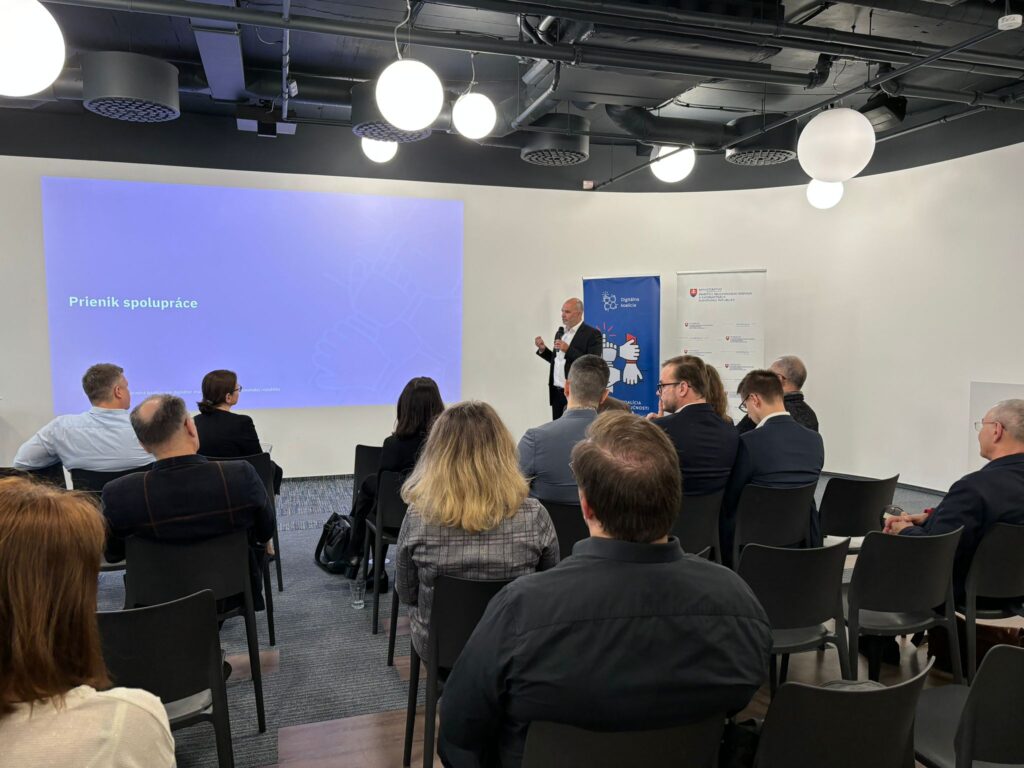The need for digital skills in the workplace will increase substantially in the future, as will the demands on environmental/green skills. It is in view of the increasing demands in these areas that it will be necessary to shape future occupations as well as to adapt the demands of employees. In particular, it is necessary to train managers so that they can then identify these necessary skills within their sectors and properly set up training for future employees, given that the education system does not sufficiently cover these areas.
As part of the national project “Digital Skills for the Green Future of Slovakia”, a round table was held with the participation of important stakeholders, namely representatives of the Ministry of Environment of the Slovak Republic, the Alliance of Sectoral Councils, the IT Association of Slovakia, the Association of Towns and Municipalities of Slovakia, the Confederation of Trade Unions, the Representation of the European Commission in Slovakia, the Association of Adult Education Institutions, the Institute of Circular Economy and many others. The President of the Digital Coalition, Mário Lelovský, explained at the opening meeting that the national project Digital Skills for the Green Future of Slovakia was created, inter alia, on the initiative of the European Commission, which developed a range of policies and initiatives to increase the digital skills of workers. In particular, the national project reflects the importance of spreading awareness of the digital and green transitions among top managers of businesses, municipalities and public authorities. The importance of the national project is also confirmed by the OECD, which highlights the importance of strengthening the capacity to respond to labour market needs and investing in adult learning, in order to ensure adequate skills in a globalised and digitalised economy, following the increase
New reference frameworks for the development of digital and green skills
The meeting presented the first important outputs of the national project in the form of reference frameworks for the development of digital and green skills. Reference frameworks for digital skills represent the range of development of cognition, thinking and communication, from the level of “Totally Non-Staff” (A1.1) to the “Expert Employee” (C1) level. Through the reference framework for the development of digital skills, we can evaluate the level of learner in areas such as Data Processing and Information Work, Communication and Cooperation, Digital Content Creation, Cybersecurity, Problem Solving Strategies. The reference framework for the development of green skills means the scale of developing knowledge, thinking and communication for green skills, from the level of ‘Totally non-self-employed’ (A1.1) to the ‘Expert employee’ level (C1). Through the reference framework for the development of green skills, we can evaluate the level of learner in areas such as Data Processing and Information Work, Communication and Cooperation, Environmental Risk Assessment and Prevention, Strategy for Sustainability Issues. Both reference arms come directly from European countries – DigiComp, DigComp Framework – European Commission (europa.eu) and GreenComp, JRC Publications Repository – GreenComp The European sustainability competence framework (europa.eu) and other important frameworks of analysis. The present reference frameworks replicate the logic of the Common European Frameworks of Reference for Languages.
The Reference Frameworks Analyst, Darina De Jaegher, explained, the proposal for a Digital Skills Reference Framework is based on the EC DigComp framework and the DaCoSiDe methodology. The reference framework for the development of digital skills in the context of the digital transformation is divided into 5 areas where each competence is assessed. The levels are divided from A1.1 to C.1., with level A1.1 being a non-separate employee who, by instructions, can search for common data and information and perform simple operations with them in the digital environment. At level C.1. it is an expert – a specialist employee can effectively manage and organise complex data in a digital environment and transform it into a structured form. Digital skills levels will be able to include employees in their CVs.
Mário Lelovský summed up that experts from the Alliance of Sector Councils would propose occupational levels and assess whether the proposed levels were realistic in practice. University graduates should reach B2.2 level for all professions, as this should be required in their education. A representative of the Slovak University of Agriculture noted that Slovak universities would certainly welcome these reference frameworks. Thanks to them, they will be able to adjust their study programmes and complement the required competences for each field of education. Klaudius Šilhar, President of the AIVD, welcomed these reference frameworks. He said that they should also be introduced into lifelong learning. If universities were to take over these frameworks, this would contribute to raising the level of Slovak universities and should be introduced as a systemic element. Diana Ripková Puhovichová, project manager of the national Digital Coalition project, added that the Slovak universities with whom bilateral meetings took place in the framework of the conference “Rax for universities, solutions for companies”, organised by the Slovak Investment and Trade Development Agency, expressed interest in these Reference Frameworks. Mr Mihalkovič from the Ministry of Environment also joined the board, who also welcomed the proposed reference frameworks.

© Slovak National Coalition for Digital Skills and Jobs
Source: European Digital Skills & Jobs Platform


